Dante’s Divine Comedy
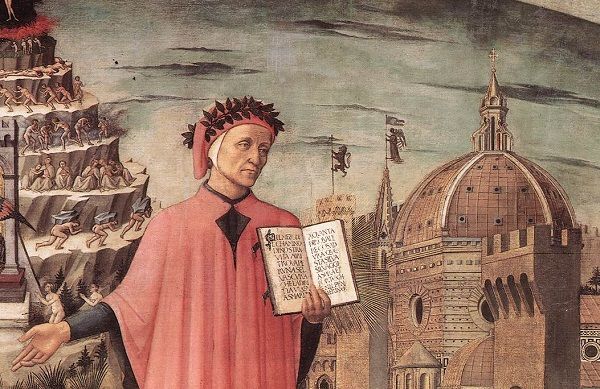
The comedy is a term from the Middle Ages. Characterizes the average style between the heights and the low style. Comedy is also a genre that starts from a start and comes to a 'happy end'. Dante's poem fits into this Medieval scheme, starting with the horror experienced by the hero in a fearsome forest, passing through hell and ending with the splendor of paradise and divine ecstasy. If Dante renounces an original title, it may be due to the awareness that human language is weak to express in a few words the richness and diversity of a work whose 14,233 poems embody with extreme intensity and colorfulness, everything he has ever known this time. The architecture of the poem lies on the Medieval interest and taste of the symbolism of the numbers. The well-balanced number of poems in each song, the thought of every event, every human occurrence, and every name gives a strong concern for the harmony of the work. Nothing is left to chance. Behind the trajectory of this neodymium journey into the odd we trace the author's conviction into the Biblical Justice and the moral order of the universe. In this cult of numbers, order, and harmony there is also something of the Renaissance boldness of the artist, creating his poetic world with the clear consciousness that he enters the competition with the creative work of God himself.
The Fantastic Journey
Divine Comedy is a story about an imaginary journey into the afterlife that took place during the Holy Week in 1300. by Dante. The story connects realism and imagination. Its reactive power is due to the brilliant imagistic imagery that often resembles the dream of the eye. In the night of Great Thursday, on Good Friday, on 7 April 8, 1300, , Dante alone and lost somewhere on the ground in some terrible forest, is saved from the shadow of Vergilius. That is how this journey begins with Dante, in which Vergilly serves him as a guide, 'on the path steep underground, the hero first finds himself in the porch of hell. Between the porch and the real hell flows the river Aheron, the river of sorrow. Hell has a cone shape, turned down, whose center reaches the center of the earth. The crossing of hell by the two heroes lasts for 24 hours. On Saturday night on Easter Sunday, Dante and Vergilius leave hell and continue through the purgatory of paradise, where Dante will find his Beatrice. It will bring it with its light and virtue to the divine. The most colorful of the three parts of the Divine Comedy is the first one dedicated to the punishments of sinners. Sin is naturally more dramatic than virtue, it has greater literary potential, and is depicted more plastic than good. That's why Part, 'Hell', is the most varied and influential.
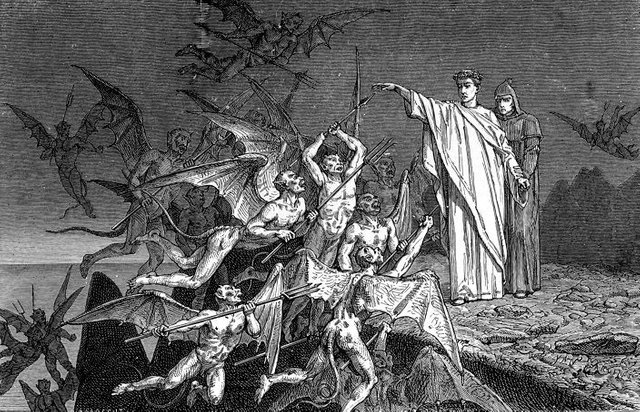
Tradition and originality
Dante is a continuation of a long story tradition, which is known from the Antiquity and the Middle Ages, presenting a descent into the underground kingdom in the world of the dead. The original one is that all impressions are broken through the viewing angle of a man, driven by his beliefs, biases, and subjective biography. In addition, the world of people is actively present in the work. In fact, the poet depicts the earthly world. It is true that Dante is inspired by religious literature and theology, but it is not intended for a living person to descend into hell to meet the convicted of eternal torment. For the first time, an ordinary man, who is not in religious sacraments, interprets the Scripture in light of his earthly human logic and seeks the life-based grounds of Divine Justice.
Diversity
The story of the poem combines literal and allegorical meaning. The poem is a true and serious work that depicts many aspects of the poet's modern life. On the other hand, it is a poetic fiction (art fiction) with its characteristic narrative figurative elements. There are two levels of imagery - objective, representing real-life lines and events, and subjective, which gives Dante's opinions and ratings as a character. There is also a spiritual mythical or allegorical meaning in the poem. This is a story of man's path from a state of sinfulness and delusion (lost in the forest) to divine exaltation and enlightenment. With the wisdom inherent in 'life, in the middle', the author gives a form of life, insights and truths. The reader remains struck by the realism of Xpesen, where the images of his political adversary (Farina) and his father's friend, Tuido Cavalcanti, are presented with exceptional historical credibility. The heroes seem to forget about hell and their punishment during their meeting with Dante. Kavalcanite Cavalcanti mistakenly grasps the poet's words that his son, dead and dying, collapses his grave. So the human, earthly dimension is constantly present. The variety of levels and meanings builds the true value of the poem in which the literal narrative, its historical grounds and its profound meaning are equally important. Personas are also present in a double in the poem. On the one hand, they are specific persons with their own biography, name, personal destiny. On the other hand, they are allegories or examples in the spirit of the Medieval specimen (a medieval genre based on concrete examples). Dante is a real person. He communicates his age and personality from the beginning. But Dante is also a model of human presence in the world. Vergilius embodies the poetry that has gathered all knowledge, all wisdom. Cato is the other of liberty, and Beatrice - of femininity, of love, and of divinity in the text.
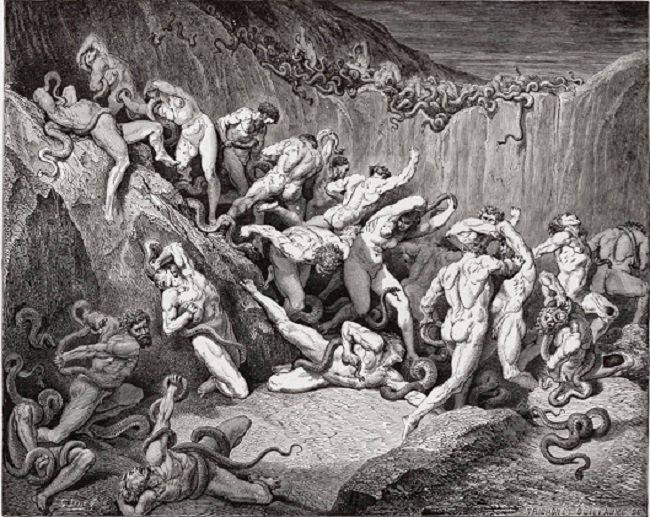
Memory
Dante's poem gives extreme attention to human memory. Dante - the author remembers Dante's character's journey. The story of this journey from the terrible memory of the wild forest (Hell 1) to its last admission, 'It is already powerless memory' (Paradise XXXIIIpensen), is fully illuminated by memory. Memory is a real actor. Divine comedy is a drama of memory that can not be restored by Dante. We are witnessing the strain of memory that is trying to resurrect past experience. That's actually 14,000 sessions. From the initial promise:
... only on the ground
I was about to fight with pity
and with the way, and for my battle
will tell you true memory
until the last confession (Paradise XXXIII, 55-60) we see the author in captivity of his memory. These fictional memories show Dante's ability to build variations on the literary theme of memory. Forgetting is also terrible by the torture of Ada. Living without glory and without reproach, the impersonal, neither good nor evil have left any trace. 'For them in the world, and there is no memory'. 'He does not want Paradise to be spotted with them and Hell does not want them in their own heart' The Renaissance taste of glory makes poet more tolerant even to his enemies, while the faceless he passes away with contempt. (Hell III) Attention to memory also expresses the curiosity of the Renaissance author to everything related to human psychology, with man's ability to create original pictures of the spirit in the form of sleep, prophecy, or through creative imagination. The imperfections of memory, along with the inexpressiveness of impressions, are elements of the big subject that affects Dante about the mystery of poetic creation. Thus, the journey of Dante's character was duplicated by the entry of author Dante into the depths of creative experience.
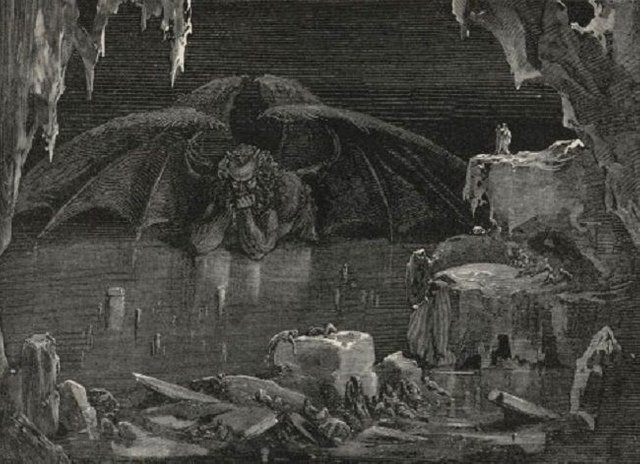
Dante's image
The hero of the poem is poet. He has the self-consciousness and self-esteem of a poet who commits himself to the great names in the field. Omir, Horaceim, Ovid, Lukian talk to him as a flat. Written in 1 person, the poem builds an ego with 3 different profiles: the real historical personality; of the author, whose voice sounds at the very beginning of the poem, as well as in the conversations with the reader and the hero who travels to the hereafter and talks with the souls of the dead. This versatility of images is complicated by the games of time, by the constant contradictions between the past and the present. Through memories the past rises, and the present at the moment of thinking is a future to the fiction of the journey. Because of this, souls can predict, related to Dante and Florence, which have already come true. Thus, while the Middle Ages ignored the autobiographical narrative, Divine Comedy revived it as a full-fledged genre. The poem as a whole and every single episode can also be perceived as moral allegory. So 1 song of 'Hell' tells how Dante, "in the field, vital in the middle," is lost in the "dark forest". Unexpectedly, there are three predatory beasts on his way - the panther, the lion and the wolf, from which Vergilius, sent by Beatrice, rescues him. Everything here is a symbol. The forest in which the poet almost dies symbolizes the human life, filled with mistakes and delusions. Beasts - these are the most hateful vices for the artist: lust, power and greed. Virgil embodies the mind, protecting the man from the vices. Beatrice embodies the divine generosity that bestows the man with bliss. Along with this work is a malicious day filled with civil passion and political passions. Here are the eminent contemporaries of the poet, his friends and enemies. The conversations are reflected in the political, philosophical and scientific issues that concern society. And above all, Dante's concern for the unity of Italy and his pain from the bloodshed between the Italian cities dominates. Dante exhibits an extraordinary skill with several characteristic shrims to present a whole string of human figures and fates. The poet is not indifferent to his encounters with them. He is angry, compassionate, faint from pity or anger.
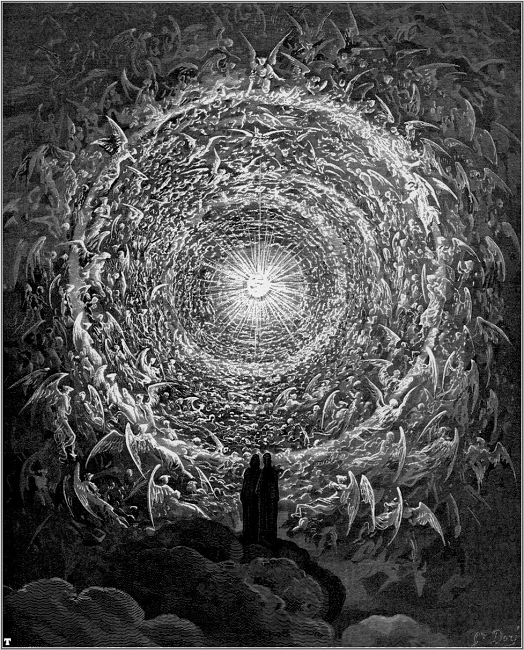
Controversy of the Age
Christian views do not allow the poet to fit his favorite antique writers and philosophers into Heaven because they were pagans. But his respect for them makes him give them a special place in a circle of hell where their souls do not feel pain. One of the most beautiful episodes in the work is the meeting of the souls of Paolo and Francesca, who have violated their husbands' allegiance while alive. Church morality forces Dante to judge them, but the Renaissance cult of love makes him sympathize without hiding his deep sympathy. Thus, alongside the impartial judgment of ecclesiastical dogmatics, the poem also expresses the subjective sense of justice, often contrary to the official canons. Pierre delle Vinnie, the pity of suicide and suicide, reacted to his life in despair after falling victim to subtle intrigues that the Christian church condemns suicide as a grave sin. But the more terrible sin of non-observance of the Christian norms for Dante is betrayal. To the traitors, he places a place in the 9 most terrible circle of hell, where the torment of fire is rivaled by persecution and infinite ice horror. In the poem is also told his encounter with the shadow of Odysseus. Here, Dante expresses his admiration for man's courage and boldness to get to know the secrets of the universe.
Poetics of Divine Comedy
Religious symbolism and medieval allegoricity combine with life and a bright reproduction of real life. Powerful fantasy never breaks from reality, and this gives the poem a sense of concreteness and credibility. Dante's artistic ability to create human characters, unique in their individuality, though sparingly presented with a characteristic gesture or stroke, puts in mind the reader memorable figures. This is, for example, the image of Farina delle Uberti, the leader of the Drenthe political opponents of Florence. Even the horror and torture of hell could not break his proud and mighty soul. All the characters in their work serve a different language, express themselves differently, and their words become a poetic means of individualisation. Their language carries the impression of social status or psychological condition. The creation of the poem in a popular language enriches Italian culture and literature.
nice. thanks for posting this :)
Nice!
Congratulations @daydreaming, this post is the most rewarded post (based on pending payouts) in the last 12 hours written by a Newbie account holder (accounts that hold between 0.01 and 0.1 Mega Vests). The total number of posts by newbie account holders during this period was 2940 and the total pending payments to posts in this category was $853.15. To see the full list of highest paid posts across all accounts categories, click here.
If you do not wish to receive these messages in future, please reply stop to this comment.
I love how you talk about it, it is a booked that ha marked me through my adolescence and how everybody used to talk about it, thanks for posting!